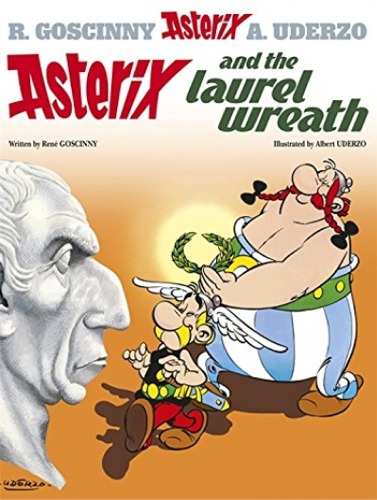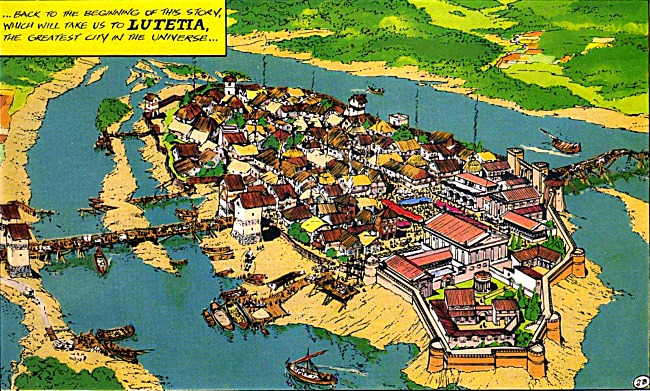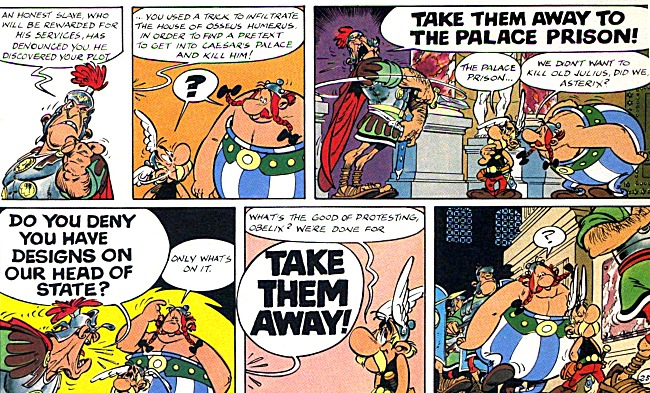Asterix vocabulary
Glossary 6/6: Asterix and the Laurel Wreath
Astérix et les lauriers de César, Astérix y los laureles del César, Astérix e os Louros de César, Asterix e gli allori di Cesare, Asterix und die Lorbeeren des Cäsar, Asterix en de lauwerkrans van Caesar, Asterix och Caesars lagerkrans, Asterix ja Caesarin laakeriseppele, Asterix a Caesarův vavřínový věnec, Zesarren erramu koroa, Els llorers del Cèsar.
I can't give you free Asterix books, but for six of them I give you a glossary of all the Latin, and the unusual words, phrases and word games.
The glossary:
- Various gods and goddesses appear in all the Asterix books. Toutatis, Belenos, Belisama, Taranis, Lug, Epona (Gaulish); Jupiter, Mercury, Pluto, Minerva, Apollo, Vesta (Roman); Zeus, Hermes, Hades, Poseidon, Athena, Ares (Greek); Ra, Isis, Osiris, Horus, Anubis (Egyptian).
- Gaul (p3). A province of the Roman empire. Today it's France.
- indomitable (p3). A person who will always resist; unconquerable.
- fortified (p3). Made into a military base with strong walls.
- shrewd (p4). Understands a situation quickly; cunning, clever like a fox.
- a potion (p4). A magical liquid.
- a druid (p4). A Celtic priest.
- a menhir (p4). A megalith, like the big stones at Stonehenge and Carnac.
- a wild boar (p4). A wild pig. Obelix's favourite food.
- mistletoe (p4). A small green plant with white fruit. It grows on trees, and people say it is magical.
- a bard (p4). A poet, musician and teacher.
- majestic (p4). Impressive, like a king.
- zigackly (p6). A drunken way to say “exactly”.
- Lutetia (p6). The Roman name for what is now Paris.
- Impedimenta (p7). The word "impedimenta" is unusual. It means "something that's inconvenient to carry". Here, it's the name of the wife of Vitalstatistix.
- rhubarb, rhubarb (p7). Traditionally, this is what theatre actors say if the script says "They mutter to each other".
- Whatsisname (p8). An abbreviation for "What's his name", this is a word you use when you can’t remember the correct word, especially when drunk... like thingy, thingamajig, thingummy, whatsit, wotsit, whosit, etc.
- tired of Lutetia (p8). A small joke from the famous saying by Dr Johnson (1709-1784), “When a man is tired of London, he is tired of life”.
- cena (p4). Latin for "dinner". It's an imitation of smart Roman customs.
- boor (p9). A rude person, a person with bad manners (pronounced the same way as “boar”, which is a wild pig).
- to bring home the bacon (p9). To earn good money.
- laurel wreath (p10). The bay laurel plant (Laurus nobilis) was used by the Romans to make a temporary crown for the winner of a game or competition.
- Zigackly ... ferpectly (p10). Obelix is too drunk to say “exactly” and “perfectly”.
- boorish (p10). Rude, uncivilised.
- a tough proposition (p12). A difficult thing to do.
- a pretty sestertius (p13). From the English expression “to cost a pretty penny” - to cost a lot of money.
- hoplite (p14). An infantry soldier from classical times in Greece and Rome.
- to get shot of my Parthians (p14). (1) "to get shot of something" is to throw it away, or to get rid of it (2) Parthian archers liked to ride their horses up to the enemy firing arrows, then turn round and ride away. At that point, the enemy relaxed and lowered his shield. The Parthian then turned around and fired a final shot (the Parthian shot) directly behind him.
- major-domo (p15). The butler, the head of the domestic staff in a big house.
- to flog (p16). (1) (formal meaning) "to whip" a person or a horse (2) (informal meaning) "to sell", for example “he flogs secondhand cars”.
- "Britons never, never, never shall be [cut-price] slaves" (p17). A line adapted from the British patriotic song "Rule Britannia”.
- resting on his laurels (p18). There is an English idiom “to rest on your laurels” which means to be so happy about one success that you stop working.
- domus (p18). Latin word - "house".
- toga (p18). Latin word - a sort of cloak.
- cubiculum (p18). Latin word - small room, bedroom.
- triclinium (p22). Latin word - "dining room".
- nose to the grindstone (p24). English expression - working very hard.
- to feel a bit ex colore (p26). Literal translation into Latin of the English expression “to feel a bit off colour”, to feel slightly ill.
- quo vadis? (p28). A military challenge (“Who goes there?”) in Latin.
- vadere quo (p28). Latin - "to go where".
- veritus odium parit (p30). Latin expression - “truth creates hatred”. (The English equivalent says the opposite - “to understand all is to forgive all”).
- Carthago delenda est (p33). Latin, from a speech by Cato about a city in modern Tunisia which had both a large trade empire and a large army which made it independent of Rome - “Carthage must be destroyed”.
- Tarpeian rock (p37). A cliff about 25 metres high on the Capitoline hill in Rome. Murderers and some other criminals were thrown off it.
- urbs (p42). Latin - "a town".
- to make old bones (p42). To live a long time.
- blotto (p47). Drunk, for example "he was totally blotto".



